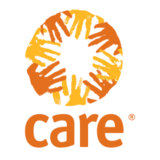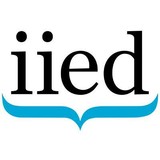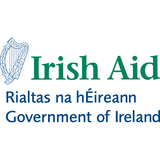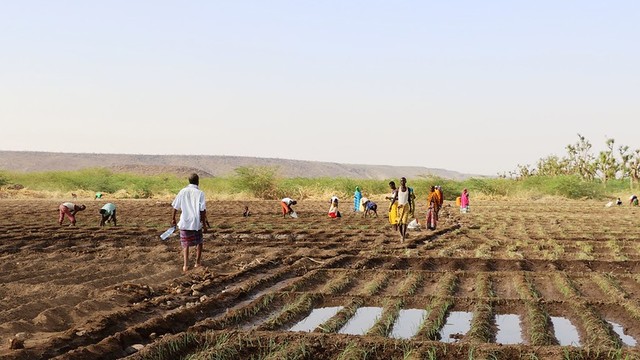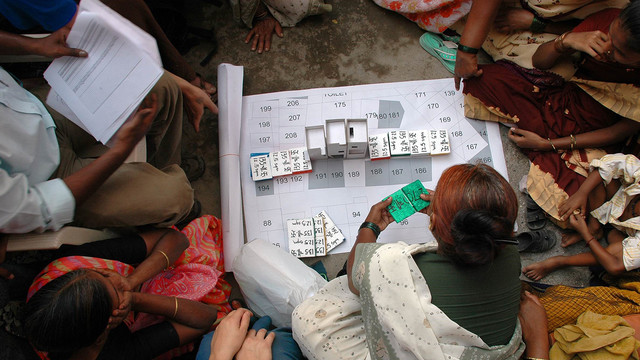Join the endorsers of the locally led adaptation principles
Over 120 governments, leading global institutions and local and international NGOs have already signed up to principles to help ensure local communities are empowered to lead sustainable and effective adaptation to climate change at the local level.

South Africa, Farm Africa and Jamaica became the newest endorsers of the locally led adaptation principles at COP27 (Photo, Anne Schulthess, IIED)
The principles for locally led adaptation to focus on greater effort and commitment needed to put more resources into local hands for local adaptation priorities.
IIED is among more than 120 organisations, donors and governments to endorse the principles and call on the global community of practice on adaptation to help move programmes, funding and practices towards adaptation that is increasingly owned by local stakeholders.
Empowering local stakeholders to lead in adapting to climate change gives communities on the frontline of climate impacts a voice in decisions that directly affect their lives and livelihoods.
Endorsing the principles
In January 2021, 40 governments and leading institutions led the way at the Climate Adaptation Summit by committing to support locally led climate adaptation.
The following May a communique issued by the G7 said it “welcomes the principles for locally led adaptation".
In November 2021 at COP26, Danida, Sida, USAID and the Dutch Ministry of Foreign Affairs were among the latest donor agencies to endorse the principles.
The number of endorsers has since climbed to over 120. They include:
ACT Alliance; Act Church of Sweden; Adaptation Fund; Africa Climate Action Initiative; African Education Program; BRAC International; CARE; Caribbean Natural Resources Institute; Catholic Relief Services; Centro para la Autonomía y Desarollo de los Pueblos Indígenas; Clara Lionel Foundation; Climate Action Network South Asia; Climate Change Africa Opportunities; Climate & Development Advice; Climate Investment Funds; Climate Justice Resilient Fund; DanChurchAid; Danish International Development Agency; Dutch Ministry of Foreign Affairs; E Co.; Environmental Defense Fund; Environmental Incentives; Farm Africa; Fauna & Flora International; FoProBim; Foundation for Integrated Rural Development; Friendship; Fundación Avina; Fundación Futuro Latinoamericano; Fundecooperación; Global Center on Adaptation; Global Environment Facility; Global Network of Civil Society Organizations for Disaster Reduction; Global Resilience Partnership; Grantham Research Institute on Climate Change and the Environment; Green Africa Youth Organisation; Helvetas; Hivos; Huairou Commission; InterAction; Inter Agency Group of Development Organisations; International Centre for Climate Change and Development; International Federation of the Red Cross Red Crescent; International Fund for Agricultural Development; International Institute for Environment and Development; International Institute for Sustainable Development; International Research Institute for Climate and Society; Irish Aid; IRO; ISET International; Islamic Relief Worldwide; IUCN; London School of Economics and Political Science; Mahila Housing Sewa Trust; Media Awareness and Justice Initiative; Mennonite Central Committee US; Mercy Corps; MINAE; Movement for Community-led Development; Mutual Trust Bank of Bangladesh; Near East Foundation; Government of the Netherlands; Government of Nepal; NIRAS; Opportunity; Oxfam; PanAfrican Climate Justice Alliance; Participatory Research in Asia; PlanAdapt; Plan International; Power for All; Presidential Climate Commission; Practical Action; Runa Ray; Save the Children; SIMAVI; Slum Dwellers International; SMART Initiative; SNV; Sophoi; SouthSouthNorth; Start Network; Sustainable Development Solutions Network; Swedish International Development Cooperation Agency; Tearfund; Tebtebba; The Nature Conservancy; Tree Aid; Government of Uganda; UK Foreign Cooperation and Development Office; UN Capital Development Fund; UN Development Programme; US Agency for International Development; Vita Impact; Wallings Nature Reserve; Wangki Tangni; Water Aid; Women's Climate Centers International; World Resources Institute; WWF International; YACEI_SL; Young Power in Social Action; Youth Climate Lab; Youth-Led CBO-Young Africans Community Empowerment Initiative; Z Zurich Foundation; Zurich Insurance.
Endorse the principles
When organisations or institutions endorse the principles, they are encouraged to outline what they intend to do differently or good practices that will be strengthened to better support or enable locally led adaptation action.
Organisations can endorse the principles to raise global ambition and action on locally led adaptation: complete this commitment form (PDF) and email it to locallyledaction@wri.org.
Sharing lessons and experiences
Different approaches to locally led adaptation are flourishing around the world.
IIED and partners have developed an interactive map of LLA experiences that provide examples of the eight principles of LLA in practice, and demonstrating that locally led adaptation works on the ground.




